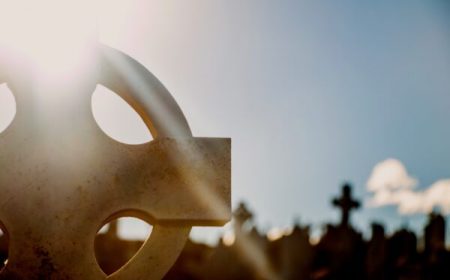Many people make it their policy to avoid discussion about death, even though it’s certain to visit all of us. In fact, our lives move along a deathward trajectory. Thousands of people die each day, and it’s the horizon before which we rise every morning. The Italian playboy Casanova resented the thought of death because it threatened to remove him from the stage of history before the end of the show. Simone de Beauvoir suggested that death instills anxiety precisely because it is “the inescapable reversal of our projects.”
Whatever the reason for one’s aversion, the fact of death is corroborated by children each evening when they kneel beside their beds and pray, “If I should die before I wake, I pray thee, Lord, my soul to take.” In this way, every nap anticipates death, a foreshadowing of the real thing, a fact that every theologian must remember. Here is how the great atheist, Friedrich Nietzsche (1844-1900), sheds light on the subject:
[The arrival of death] is always like the scene at the last moment before the departure of a ship full of emigrants: people have more to say to one another than ever, time presses; the ocean with its desolate silence is waiting impatiently behind all the noise—so greedy and certain of its prey. Yet all of them think that what happened before is little of nothing, while the near future is everything. And hence this bustle, this shouting, this vying to drown out and push ahead of everyone else. Everyone wants to be first in this future—and yet death and the silence of death are the only thing certain and shared by all in this future. How strange that this, the only certainty and commonality, makes practically no impression on people, and that the last thing they feel is their brotherhood in death.[1]
Listen carefully to Nietzsche’s description of life: “bustle, shouting, vying to drown out and push ahead of everyone else.” And what’s the final outcome of such noise? Death! Despite good things that may be created along the way, our lives still end in the grave. It’s not very often that I find myself agreeing with the German atheist, but, in this case, old Friedrich had it right.
That Death Itself Would Die
But there is good news in the face of death. Jesus came to conquer the desolate silence that preys upon humanity. How so? By shedding his blood upon the cross and by rising from the grave. This, according to the New Testament, is the new and living way that Christ opened for us through the curtain, that is, through his flesh (Heb 10:20).
Because the ministry of Jesus was cruciform—shaped and directed by his cross—we, his followers, submit ourselves to the same pattern. We put to death selfish pride in favor of a life that worships and serves the living God. The result? New life in Christ—resurrection life.
Casanova resented this message. Nietzsche dismissed it as mere fable. And millions of people today respond in much the same way. In the meantime, Jesus Christ is seated in heaven, full of grace, patiently waiting for the age to conclude before he returns in glory. His power dissolves the tenuous pace of the world’s bustle and shouting by removing our guilt and giving us life, a power that is available to all of who repent and believe in the Savior.
As we begin this New Year, let’s enter more deeply into the death and resurrection of Christ, and give ourselves more fully to the task of helping others to raise their sights above the horizon of earthly commotion. Together, let’s look to the One who died in our place and rose from the grave, that death itself would die.
Footnotes:
[1] Friedrich Nietzsche. The Gay Science: The Joyful Wisdom. Trans. Thomas Common. Paragraph 278. Lawrence, KS: Digireads), 104.





